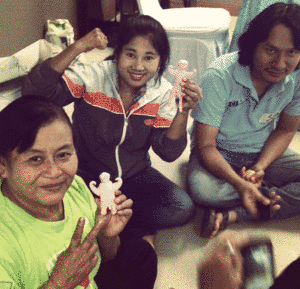
UNESCO Bangkok provided technical support for a Plan Thailand refresher course on gender equality in Tak province, which was attended by 22 staff members and migrant volunteers from the Migrant Assistance Program Foundation (MAP) and Foundation for Education and Development (FED).
The training on 23 July was part of the broader three-year UNESCO-Plan International Thailand project, “Healthy Sexuality: The Story of Love”. The initiative aims to improve adolescent sexual and reproductive health knowledge, awareness and practices of Myanmar migrants from the ages of 15-25 in communities and workplaces in Mae Sot, Phrop Phra, and Mae Ramad districts of Tak province.
Participants at the recent training session were encouraged to recognize the cultural influences that shape their views on gender, particularly in a patriarchal culture that keeps women from speaking openly about their sexual lives.
The first part of the training comprised discussions on the cultural roots of gender inequality, expected gender roles and power imbalances, as well as exchanges on sexual desires and fantasies and safe sex practices.
Myanmar female participants were encouraged to take active roles in leading these discussions. By the end of the training, they all had had the chance to talk about sex, sexual relationships, and the difficulties they have faced in dealing with the expectations placed on them as women. Participants also openly shared ways to encourage young people to use condoms and lubricant. One group activity saw participants fashion play dough into their idea of a "sexy body". Participants had to verbally guide the creation of the sculptures by expressing their preferences. This activity and the session overall offered a rare opportunity for Myanmar women to be involved in open exchanges on these topics.
Prempreeda Pramoj Na Ayutthaya, HIV and AIDS National Programme Officer for UNESCO Bangkok, said that the female participants benefited from the opportunity to step out of their comfort zones. “The training allowed Myanmar women participants to do things that they wouldn’t otherwise do in a group with men present, such as handling a condom and openly discussing sexuality,” said Prempreeda.
Male participants, meanwhile, were invited to share their thoughts from a different perspective – putting themselves in the shoes of the women in their society and the challenges posed by gender stereotypes.
Discussions on both sides also focused on gender diversity and stigmatization as well as discrimination towards LGBT people. Issues around sexuality and HIV prevention were the focus of the second half of the training, which encouraged men in particular to communicate openly on matters of sexual health with their partners.
Matana Bunnag, HIV/AIDS Manager for Plan Thailand, said that with their improved understanding of issues related to gender equality and sexual and reproductive health, these participants will be better equipped to share their knowledge with young Myanmar migrants in their communities. “It is great that the training has happened in the Thai-Myanmar border area, where gender inequality is still an issue within families,” Matana said. “I think the training went well. Participants were fully engaged and had fun at the same time. As a result, they are beginning to be aware of gender issues.”
Pre- and post-training evaluations were completed and the results will be used to inform future work. Organizers have already recommended advanced training for participants on HIV prevention, sexuality and human rights as well as for new groups of Myanmar migrants in Mae Sot, Tak, to be recruited for future sessions.
For further information, contact: Prempreeda Pramoj Na Ayutthaya (p.pramoj@unesco.org)
